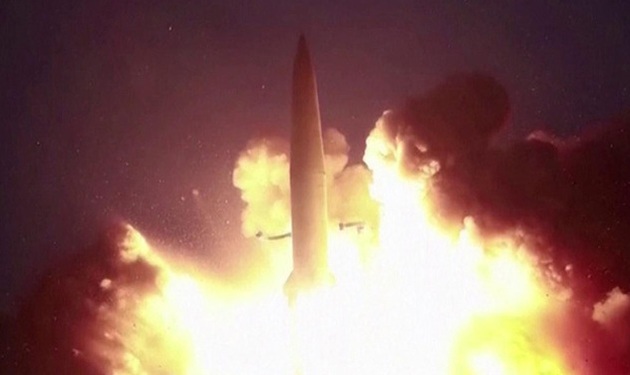North Korea test-fired two ballistic missiles into the sea off the east coast of the Korean Peninsula on Wednesday, September 15 according to Seoul’s Joint Chiefs of Staff. The missiles were fired from the central county of Yangdok in South Pyeongan province and flew around 800 kilometers (497 miles) at an altitude of around 60 km. They did not enter Japanese territorial waters, according to Japan’s Defense Ministry, although they did land in Japan’s Exclusive Economic Zone, The Diplomat writes.
Just a few days after conducting cruise missile tests, North Korea showed its so-called adversaries that it is still developing more advanced weapons by testing ballistic missiles – which is a violation of U.N. Security Council Resolutions – and firing them toward Japan. It was the first ballistic missile test in six months and came after Washington expressed its willingness to renew dialogue with the North.
“While we have assessed that this event does not pose an immediate threat to U.S. personnel or territory, or to our allies, the missile launch highlights the destabilizing impact of the DPRK’s illicit weapons program,” U.S. Indo-Pacific Command said in a statement, referring to the formal name of North Korea. “The U.S. commitment to the defense of the Republic of Korea and Japan remains ironclad,” INDOPACOM added.
A few hours after the North’s ballistic missile launch, South Korea’s presidential Blue House officially announced its first successful underwater submarine-launched ballistic missile (SLBM) test on Wednesday afternoon. The missiles flew the planned distance and hit a target while President Moon Jae-in was observing, according to the Blue House. South Korea is now the seventh country in the world to possess SLBMs – not counting the North, which has never provided clear information on its own underwater SLBM launch test.
Kim Yo Jong, the sister of North Korean leader Kim Jong Un, responded by saying that Moon’s comments at the SLBM launch about deterring North Korean provocations could lead to a breakdown in relations. “If the president joins in the slander and detraction [against North Korea], this will be followed by counter actions, and the North-South relations will be pushed toward a complete destruction,” she said. “We do not want that.”
On Tuesday, special envoys of the United States, South Korea, and Japan gathered in Tokyo to discuss shared concerns related to the denuclearization of North Korea and reaffirm trilateral cooperation. Sung Kim, the U.S. special envoy on North Korea, has consistently sent a message to Pyongyang that he is ready to sit down with his North Korean counterparts “anytime, anywhere, and with no preconditions.”
In addition, Kim and his South Korean counterpart discussed offering humanitarian assistance to North Korea, as the country’s devastating economic crisis is expected to deepen under the U.N.-led economic sanctions and the impact of the COVID-19 pandemic. After the meeting on Tuesday, Kim urged Pyongyang once again to engage in dialogue with Washington. Pyongyang’s response to the U.S. envoy’s call to embed “permanent peace” in the Korean Peninsula was test-firing two ballistic missiles.
Also on Wednesday, Chinese Foreign Minister Wang Yi had a meeting with his South Korean counterpart, Chung Eui-yong, to discuss bilateral cooperation on the denuclearization of the North. However, Wang refrained from criticizing the missile tests of the North.
As the quick succession of missile tests shows, the tense situation between the two Koreas has sparked an arms race on the Korean Peninsula. A recent poll shows that South Koreans support the redeployment of tactical nuclear weapons on Korean soil to counter the North’s military provocations and ensure national security. A majority of Koreans believe that the South needs to develop more weapons to fend off the nuclear threats of the North.
At the summit between Moon and U.S. President Joe Biden in May, U.S. and South Korea agreed to terminate the missile guidelines that were first signed in 1979 to put limits on the South’s missile development program. The South Korean Defense Ministry’s initiative to develop more weapons is finding popular support at home.
However, some experts say that the North’s recent military activities could be a positive sign, indicating that denuclearization negotiations – whether bilateral or multilateral – are likely to happen in the near future. “Something is going to happen on the diplomatic front and some kind of multilateral negotiations can be made public in the near future,” said Andrei Lankov, a professor at Kookmin University in Seoul and a director of Korea Risk Group, in an interview with The Diplomat. Lankov pointed out that the North’s missile launch could indicate the diplomatic solutions are about to come out, as representatives of related countries in East Asia are having meetings this week. “North Korea wants to improve their negotiating position and they want to remind all that they exist and [require] attention,” Lankov said.
The North’s message has been clear: No U.S. concessions, no dialogue. Two very different paths could follow from here: the next Cold War or a long-term phased denuclearization progress involving multilateral cooperation.






